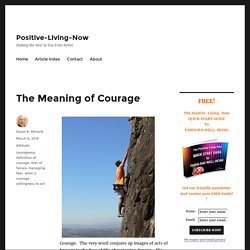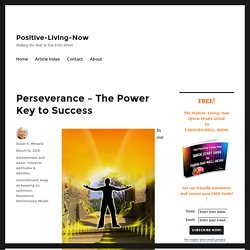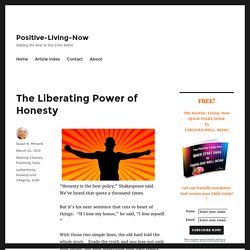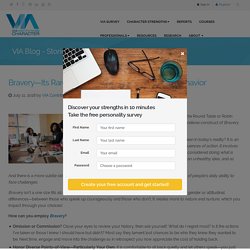

” Maya Angelou
“Courage doesn't always roar. Sometimes courage is the quiet voice at the end of the day whispering, 'I will try again tomorrow.'” Mary Anne Radmacher. The Meaning of Courage. Courage.

The very word conjures up images of acts of bravery in the face of life-threatening danger. We envision roaring flames, mountainous drops, raging rivers, a hail of bullets, a screech of wheels, and some heroic soul putting it all on the line to save the life of another or reach the heights. We love the stories. They sing of the best in us. We feel larger just for hearing them. And rightly so, because each of us is courageous in his or her own way. A Definition of Courage The best way to start is to consider a definition of courage. “Courage,” he says, “is the willingness to act toward a moral and worthwhile goal despite the presence of risk, uncertainty and fear.”
I particularly like it because he adds the phrase “toward a moral and worthwhile goal” to the definition. Not all risk-taking signifies courage. Interestingly, it’s that goodness that keeps us from recognizing our own courage. Perseverance - The Power Key to Success. In our instant-gratification, short-attention-span, multitasking world, we’ve lost sight of one core element of high achievement.

That element is perseverance – the power key to success. The ability to keep on keeping on, even when our efforts are met with disappointment or failure, is an ability that can make all the difference in the world. And that’s the definition of perseverance: to keep on keeping on. It comes from being committed to your goal, and from believing in yourself and in your goal’s possibility. It borrows strength from resilience and optimism and brushes elbows with courage along the way. Listen to the story of anyone who has reached a significant goal and you’ll hear a drama about someone who had to rebound from setback after setback along the way. Angela Duckworth and her colleagues at the University of Pennsylvania looked at a trait they call grit, a combination of perseverance and passion, the sustained and focused application of a talent over time.
The Liberating Power of Honesty. “Honesty is the best policy,” Shakespeare said.

We’ve heard that quote a thousand times. But it’s his next sentence that cuts to heart of things: “If I lose my honor,” he said, “I lose myself. ” With those two simple lines, the old bard told the whole story. Evade the truth and you lose not only your honor, but your undermine your own reality. Positive psychologists recognize the association of honesty with integrity and genuineness, too. Setting an Absolute Standard We all like to think of ourselves as basically honest. If you’re seeking to be a whole, happy and flourishing, being “basically honest” isn’t good enough. When you pretend to yourself, you cheat yourself of the opportunity to look squarely at the things that you wish were different and to take measures to change them.
Increase Your Happiness: Add Some Zest to Your Life. No matter how badly the day was going, the energy in the room picked up whenever Jack walked through the door.

Jack was a big and boisterous man, whose face easily broke into a smile. “How’s it going, Jack?” Someone would ask him. And, without fail, Jack would boom out, “Beautiful!” Jack’s zest for life made us all smile. Positive psychologists say that zest is one of the five character strengths that contribute most to a sense of life-satisfaction. Zest is defined as “a sense of expectation, intuition, hope, energy and excitement.”
Vulnerability. Authenticity. Joy. How can you employ Bravery? July 11, 2018 by VIA Contributor · The moment the word Bravery is expressed visions of the Round Table or Robin Hood and Maid Marian dance across the mind.

This grandiose construct of Bravery rarely is required in business. So, what does the VIA character strength of Bravery mean in today’s reality? It is an understanding of risk and an acceptance of the consequences of action. It involves the mastery of fear rather than fearlessness. And there is a more subtle side as psychoanalysts have concluded that Bravery is present as part of people’s daily ability to face challenges.
Bravery isn’t a one size fits all as studies confirm there are few common demographics—including gender or attitudinal differences—between those who speak up courageously and those who don’t. How can you employ Bravery? Omission or Commission? In part, Bravery encompasses reasoned judgment. Take the VIA Survey and discover where Bravery appears in your results: References: Ibid, page 215. Start. Individuation. Self-Help. Accountability. Willpower. Consistency. Choice. Fear. Know-How and Action. Know-How to Become. Stretching Yourself.